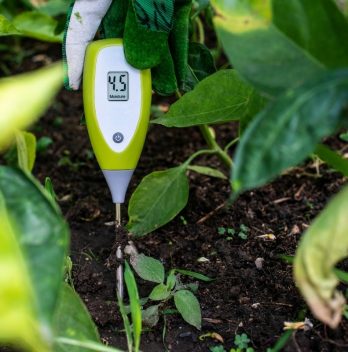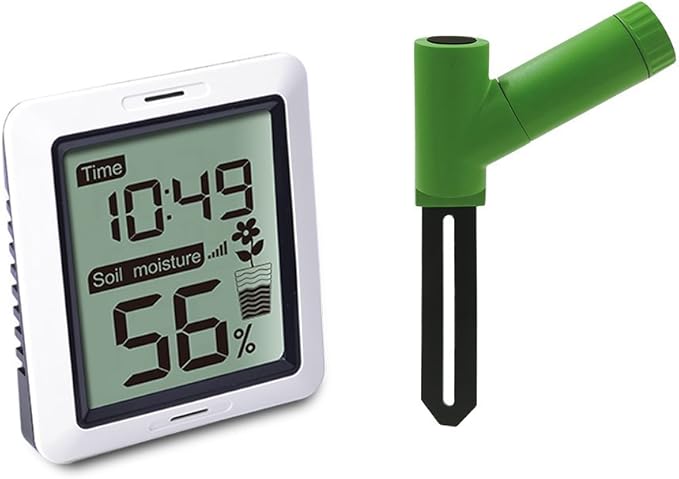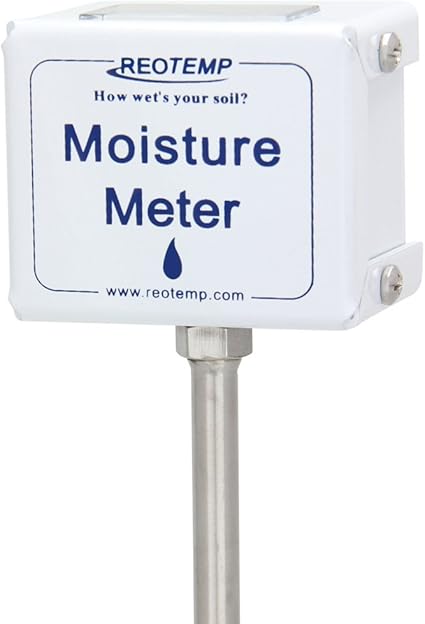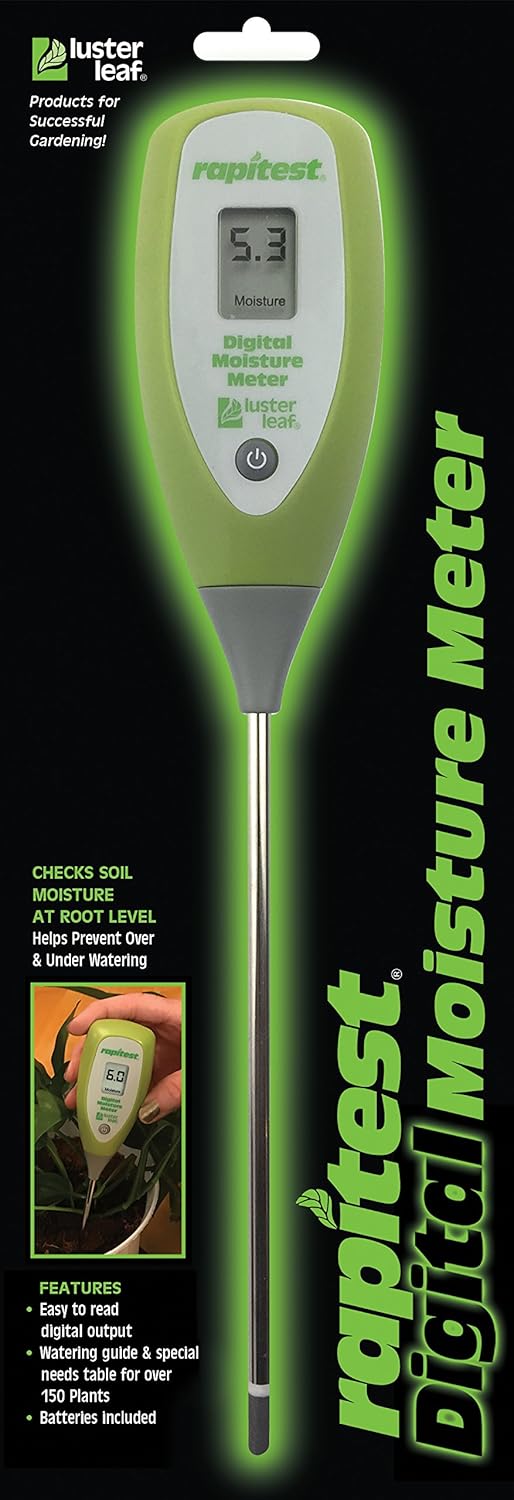It is possible to get to know how your plants are doing by using the
Do you sometimes wonder what’s going on under the surface of your
What is a Soil Moisture Meter
A

If you have been for a solution like this one, go ahead and get yourself a moisture meter. A
Why use a Moisture Meter?
Here are a few benefits of using the
- Helps you understand your plant better. The main reason why you use a
soil meter is so you can understand your plant better. This will help you care for it better. Poor watering schedules can either cause the plant to be dry or waterlogged. This leads to long term damage or the demise of the plant. Being able to know how much moisture thesoil holds under the surface, you get to know exactly how to water your plants. - Saves you water. Especially for outdoor plants, you might be wasting a lot of water by overwatering. By checking the moisture content of the coil, you can end the guesswork of when you should water. This potentially saves you lots of water.
- Saves you money. By saving the amount of water you use on your farm, you save the money you pay the water bill. Some plants are also very expensive to buy and if you destroy them by overwatering you loose on some good money. A moisture meter will help you water your plants properly and save you money on replacing dying ones.
Features to Look for When Buying a Soil Meter
The type of
- For indoor use, select a moisture meter that has a short slender stem.
- For outdoor use, choose a more robust meter with a long and sturdy stem. These long-stemmed meters are a bit expensive compared to the slender short stem meters.
- For hard
soil like clay, choose a very thick and strong stem meter to prevent damage.
The Best Soil Meter to Work with
There are all kinds of
Let’s help you out with finding the best in different categories. Using our buyer’s guide you get to learn a few things about the best moisture meters and choose the right one for yourself.
Best Overall: XLUX T10 Soil Moisture Sensor Meter
XLUX
This moisture meter is not considered heavy duty; it warns you not to jam it with hard or compact
To read the moisture level, simply put the moisture meter’s stem into your
Pros
- Low cost
- 18-month warranty
- Simple to use
- No batteries or charging required
- Works effectively
Cons
- Very delicate
- Best suited for soft
soil
Best Digital Display: ECOWITT WH0291 Soil Moisture Tester with LCD Display
ECOWITT moisture meter has an easy to read wireless LCD that shows the
This digital meter is easy to use and accurate. It can be calibrated for both low and high humidity environments adding to its accuracy. It uses 2 AA batteries that will need replacement often.
Pros
- Easy to use
- Comes with an LCD
Cons
- Uses batteries that you have to replace often
Best Built: REOTEMP Garden and Compost Meter
REOTEMP is a battery-powered moisture meter made from stainless steel. The moisture content is measured at the tip of the stem that is 15 inches long. It reaches deep into the
This meter has a scale of 0-10 wetness scale. It adjusts depending on the specific moisture requirements of a plant. The meter uses 1 AAA battery that powers it. Do not use this meter to read soils with high salt content because
REOTEMP is well built and sturdy. It has a steel stem and aluminum casing that makes it a tough meter. This tester can be inserted deep into dense
Pros
- It is sturdy
- Has a long stem
- Easy to calibrate
- Suitable for both
soil and compost
Cons
- Fairly costly
Best Analog: DR. METER S10 Soil Moisture Sensor Meter
DR. METER comes with an 8-inch metal stem that reads the moisture levels at the root of the plants. It has an easy to read dial with a color-coded display for moist, dry, and wet readings. This meter does not require batteries or charging and it works both indoors and outdoors.
It is suitable for both indoors and outdoors but does not work on hard ground which could damage it. Do not submerge it in waterlogged soils because you will destroy it.
Pros
- Low cost
- No batteries required
- Gives sensitive readings
- Easy to use
Cons
- Not for use in hard soils
Best Digital reader: LUSTER LEAF Digital Moisture Meter
LUSTER LEAF is best for use on
It offers a digital reading that comes with information on over 150 types of plants. This helps you understand what to do with the readings you have received. It uses batteries to work and comes with a special cleaning pad.
Pros
- Low cost
- Digital reader
- Easy to use
- Batteries and cleaner included
Cons
- Only used in container plants
- Has a short probe
Best 3 in 1: SURENSHY Soil Tester Meter
SURENSHY has a 3 in 1 ability to test
It is easy to use by inserting the
SURENSHY meter does not need a battery or charge to read. It is easy to use by inserting it into the
Pros
- Easy to use
- 3 in 1
soil reader - Does not need batteries or charge
Cons
- Does not test hard soils
FAQs
Soil Moisture Sensors that use the Capacitance Method Capacitance-based soil moisture sensors are by far the most popular type of soil moisture sensor on the market today. They’re also the most accurate and are easy to use. They measure the electrical capacitance between two parallel metal plates. The higher the capacitance, the more water there is in the soil. Capacitance-based soil moisture sensors can be installed anywhere in the soil profile, including at or below ground level. The downside is that they require a power source and typically need to be powered by an AC outlet. 1.They can also be quite expensive. Soil Moisture Sensors that Use the Resistance Method Resistance-based soil moisture sensors measure the amount of electrical resistance between two metal plates. The higher the resistance, the more water there is in the soil. They can be installed anywhere in the soil profile, including at or below ground level. The downside is that they require a power source and typically need to be powered by an AC outlet. They can also be quite expensive. Soil Moisture Sensors that Use the Infrared Method Some soil moisture sensors use infrared (IR) technology. They measure the amount of heat emitted from the surface of a sensor pad. The higher the temperature, the more water there is in the soil. These sensors are very sensitive to the environment and have a limited range. They’re usually installed at or below ground level. The downside is that they require a power source and typically need to be powered by an AC outlet. Soil Moisture Sensors that Use the Thermocouple Method Some soil moisture sensors use thermocouples. They measure the amount of heat generated by the thermocouple when it comes into contact with the soil. The higher the temperature, the more water there is in the soil. These sensors can be installed anywhere in the soil profile, including at or below ground level. 1.Soil Moisture Meter Features You Need to Consider We’ve put together a list of some of the most important features that you should consider when buying a soil moisture meter. 2. Accuracy The first thing you need to look at is the accuracy of your soil moisture meter. This will be one of the most important factors in determining if this is the right soil moisture meter for your farm. When you’re considering purchasing a soil moisture meter, make sure to look at the accuracy of the device. There are several different ways to measure soil moisture, but one of the best ways to check the accuracy of your soil moisture meter is by testing it against a standard. The National Irrigation Association recommends using a device called a “reference meter”. A reference meter is basically a standard measuring device that you can use to compare your soil moisture meter to. If you find that your soil moisture meter is off, then you know you need to get a new meter. 3. Watering System Size It’s also important to consider how much water your farm will be using. If you have a large farm with lots of acres, then you may want to invest in a larger watering system than what you need for a smaller farm. The size of your farm will affect the size of your irrigation system. If you’re looking for a small and portable watering system, then you can opt for a low-pressure system that is easy to move from one place to another. A higher pressure system may not be suitable for a smaller farm. You can also get a solar watering system. Solar watering systems are perfect for farms with no access to electricity. This will allow you to water your plants throughout the year even when there isn’t any power. 4. Watering Options When it comes to watering your crops, there are several different options you can choose from. One of the most common watering options is drip irrigation. Drip irrigation is a great option because it doesn’t waste as much water as other methods. With this type of system, you can control how much water is going into the soil and how much is being wasted by running off. Another type of watering system is sprinklers. Sprinklers are usually used to irrigate large areas, such as lawns and golf courses. You can also use sprinklers to water individual plants. It’s important to consider how much water you will need to use on your farm. This will help you decide which type of watering system will be best for your farm. 5. Water Conservation A good way to conserve water is to make sure that you don’t over-water your crops. If you have a drip irrigation system, then you can easily turn the water off when your crops are done being watered. The average soil moisture meter costs between $35 and $100, but prices vary greatly based on the brand. The prices for these devices can be lowered by purchasing used models, but there are also some risks involved when buying used equipment. Keep Learning Most soil moisture meters use a combination of radio waves and sensors to determine the amount of water in the ground.Which is the most popular soil moisture sensor?
What are some other quality moisture sensors?
What should you consider when shopping around?
How much does a soil moisture meter cost?
Conclusion
In the end, the goal is to make sure you end up with the right meter for your kind of






